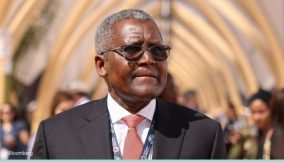Several African nations reported minimal outstanding credit from the International Monetary Fund (IMF) as of Q4 2024, showcasing diverse fiscal strategies across the continent. While some countries leverage IMF credit for structural reforms, others prioritise limiting external borrowing to focus on sustainable growth.
Nations with low or no IMF debt illustrate sound fiscal management and economic planning. By directing funds toward infrastructure, healthcare, and education instead of debt servicing, these countries enjoy greater budgetary flexibility. This approach also allows them to avoid the austerity measures often tied to IMF loans, enabling policies tailored to local development goals.
Read also: Here are 10 African countries with the least IMF debt in Q3 2024
With reduced reliance on external funding, these nations strengthen domestic economies, build resilience against global shocks, and foster sustainable growth through diverse revenue sources and strategic resource management. The balance between external debt and domestic priorities remains critical as African countries strive for long-term development.
According to the IMF, here are the 10 African countries with the lowest total IMF credit outstanding as of 2 December 2024.
1. Lesotho
Lesotho leads the list with the lowest outstanding IMF credit with $11.66 million. The Southern African nation has maintained a modest borrowing level, reflecting its efforts to balance financial support from global institutions.
2. Comoros
Comoros ranks second with $18.11 million in credit owed to the IMF. The island nation continues to navigate its economic challenges with measured borrowing.
Read also: UPDATED: Top 10 African countries with low IMF Debt
3. São Tomé and Príncipe
São Tomé and Príncipe follow with $24.02 million in outstanding credit. The nation’s borrowing remains focused on addressing key developmental and fiscal gaps.
4. Djibouti
Djibouti, strategically located in the Horn of Africa, owes $31.80 million to the IMF. The country has managed to limit its external debt while focusing on infrastructure and port development.
Read also: UPDATED, top 10 African countries facing the biggest IMF debts
5. Eswatini
Eswatini ranks fifth, with an IMF debt of $39.25 million. The country’s reliance on international financial assistance has remained relatively restrained.
6. Guinea-Bissau
Guinea-Bissau owes $48.57 million to the IMF. The West African nation has been working to stabilise its economy while addressing domestic fiscal needs.
Read also: Africa’s 10 most indebted countries
7. Cabo Verde
Cabo Verde, an island nation with a tourism-driven economy, has an IMF debt of $64.98 million. The country continues to prioritise financial stability and sustainable growth.
8. Equatorial Guinea
Equatorial Guinea’s outstanding credit stands at $74.10 million. The oil-dependent economy has relied on IMF support to address budgetary and economic reform needs.
Read also: 10 least indebted African countries in 2024 – IMF
9. Somalia
Somalia, recovering from years of instability, owes $79.50 million to the IMF. The nation has focused on leveraging international financial assistance to rebuild its institutions and economy.
10. Seychelles
Seychelles concludes the list with $94.29 million in IMF debt. The Indian Ocean archipelago has used international credit to bolster its economy while maintaining manageable debt levels.
Join BusinessDay whatsapp Channel, to stay up to date
Open In Whatsapp





